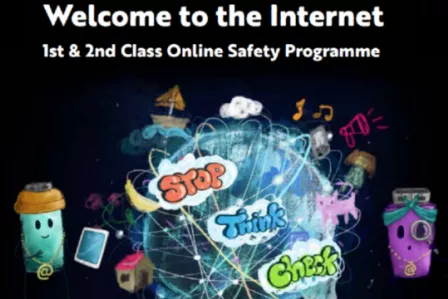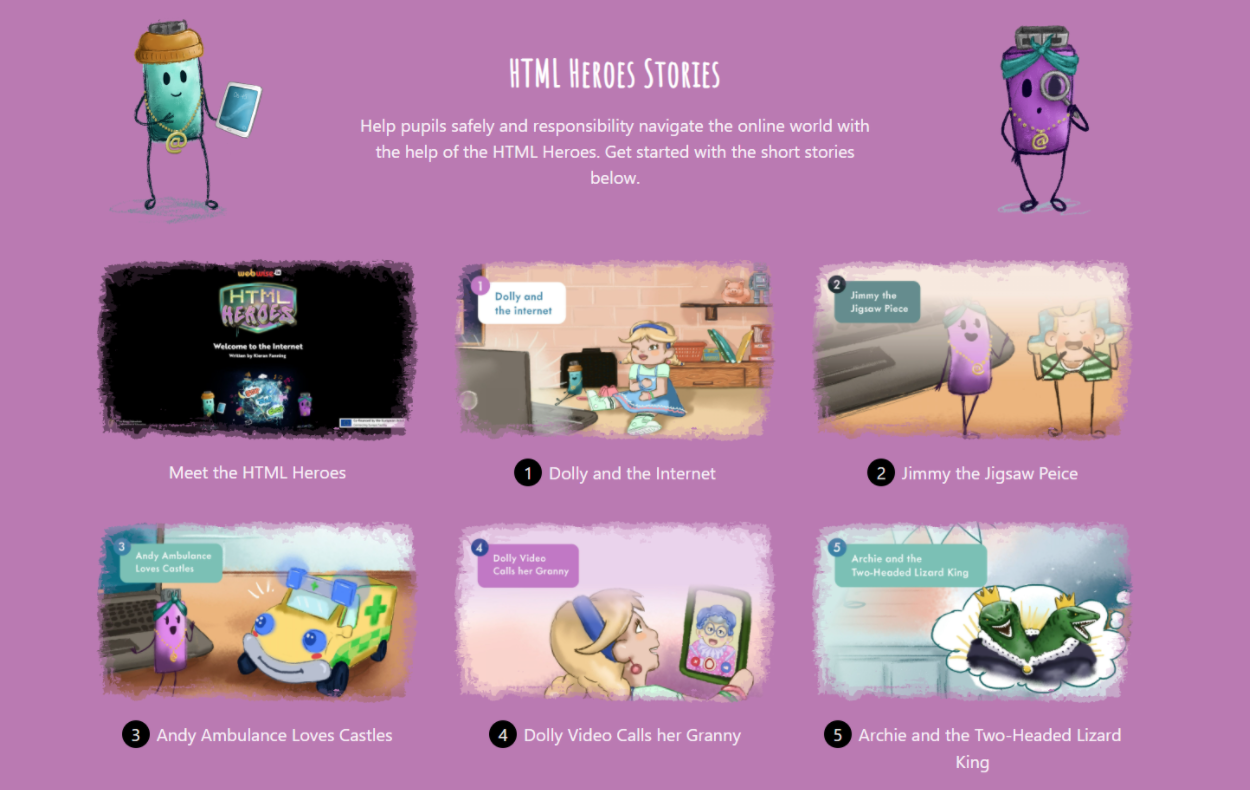“HTML Heroes: Welcome to the Internet” was officially launched in September 2021 by the Irish Minister for Education, Norma Foley TD. She commented: “To best equip children and young people to make the most of the internet, we need to begin from an early age. Like road safety, children need to know the basics of accessing the internet, how to use it effectively and safely, and know what to do if something goes wrong and where to get help and assistance. It is my hope that this new programme from Webwise will help teachers and school staff build these foundations with pupils in an age-appropriate manner. Through colourful illustrations, stories and an online safety code that reinforces key safety messages, the new HTML Heroes Programme for first and second class is an excellent starting point for children”.

The HTML Heroes Programme has been designed for teachers of first and second classes to introduce pupils to the first steps of accessing and using the internet safely and responsibly.
The resource has five lessons that can be explored separately or delivered as a whole unit. The lessons examine how to use the internet safely, how to communicate online, how to play and learn online, and how to get help and support:
- Lesson 1: Welcome to the internet
- Lesson 2: Searching online
- Lesson 3: Playing and learning online
- Lesson 4: Chatting online
- Lesson 5: My time online
Through five short, illustrated stories, pupils will learn the basic skills for being safe and secure online, including why it is essential to stop, think, and check when accessing the digital world. The five lessons provide opportunities to engage with digital technologies and highlight the benefits and opportunities the internet brings, while also equipping pupils with the required skills to safely navigate the digital world. The programme concludes with an animated online safety code song.

The new programme can be accessed on the Webwise website, where you can also find further details about the programme. Hard copies of the HTML Heroes Teacher Handbook and Storybook are also available to order for free.
At the launch, Ciara O’Donnell, National Director, Professional Development Service for Teachers, said: “Children have the right to enjoy childhood online, to access safe online spaces, and to benefit from all the opportunities that a connected world can provide, as appropriate to their age and stage. In the same way, we introduce children to road safety through the safe cross code, this programme is designed to guide children and young people through the first steps of online engagement and reinforce key safety messages while also promoting the benefits of the internet.”
Find out more about the work of the Irish Safer Internet Centre, including their awareness raising, helpline, hotline and youth participation services – or find similar information for Safer Internet Centres throughout Europe.
“HTML Heroes: Welcome to the Internet” was officially launched in September 2021 by the Irish Minister for Education, Norma Foley TD. She commented: “To best equip children and young people to make the most of the internet, we need to begin from an early age. Like road safety, children need to know the basics of accessing the internet, how to use it effectively and safely, and know what to do if something goes wrong and where to get help and assistance. It is my hope that this new programme from Webwise will help teachers and school staff build these foundations with pupils in an age-appropriate manner. Through colourful illustrations, stories and an online safety code that reinforces key safety messages, the new HTML Heroes Programme for first and second class is an excellent starting point for children”.

The HTML Heroes Programme has been designed for teachers of first and second classes to introduce pupils to the first steps of accessing and using the internet safely and responsibly.
The resource has five lessons that can be explored separately or delivered as a whole unit. The lessons examine how to use the internet safely, how to communicate online, how to play and learn online, and how to get help and support:
- Lesson 1: Welcome to the internet
- Lesson 2: Searching online
- Lesson 3: Playing and learning online
- Lesson 4: Chatting online
- Lesson 5: My time online
Through five short, illustrated stories, pupils will learn the basic skills for being safe and secure online, including why it is essential to stop, think, and check when accessing the digital world. The five lessons provide opportunities to engage with digital technologies and highlight the benefits and opportunities the internet brings, while also equipping pupils with the required skills to safely navigate the digital world. The programme concludes with an animated online safety code song.

The new programme can be accessed on the Webwise website, where you can also find further details about the programme. Hard copies of the HTML Heroes Teacher Handbook and Storybook are also available to order for free.
At the launch, Ciara O’Donnell, National Director, Professional Development Service for Teachers, said: “Children have the right to enjoy childhood online, to access safe online spaces, and to benefit from all the opportunities that a connected world can provide, as appropriate to their age and stage. In the same way, we introduce children to road safety through the safe cross code, this programme is designed to guide children and young people through the first steps of online engagement and reinforce key safety messages while also promoting the benefits of the internet.”
Find out more about the work of the Irish Safer Internet Centre, including their awareness raising, helpline, hotline and youth participation services – or find similar information for Safer Internet Centres throughout Europe.
- media literacy media education education digital skills
Related content
- < Previous article
- Next article >












